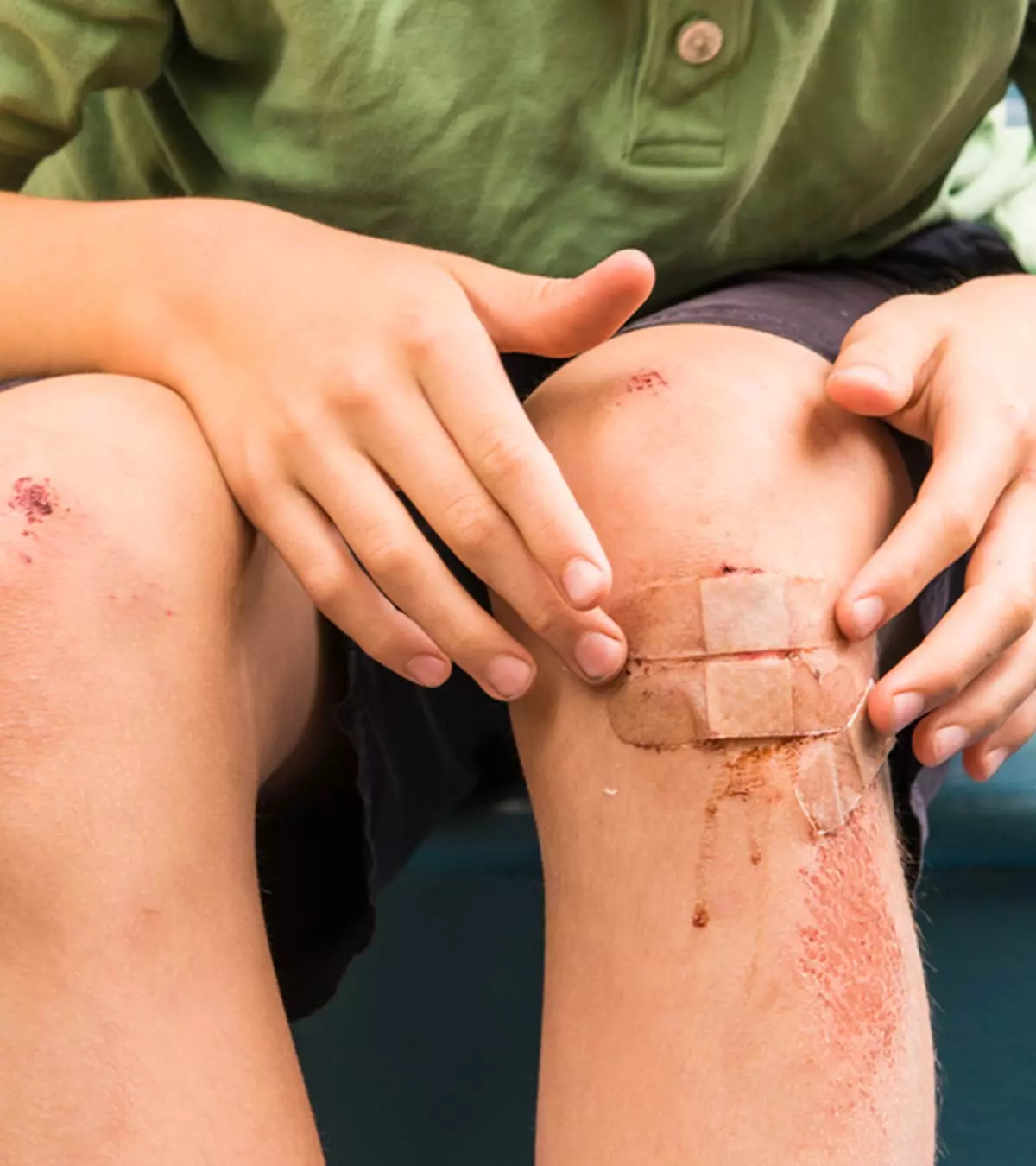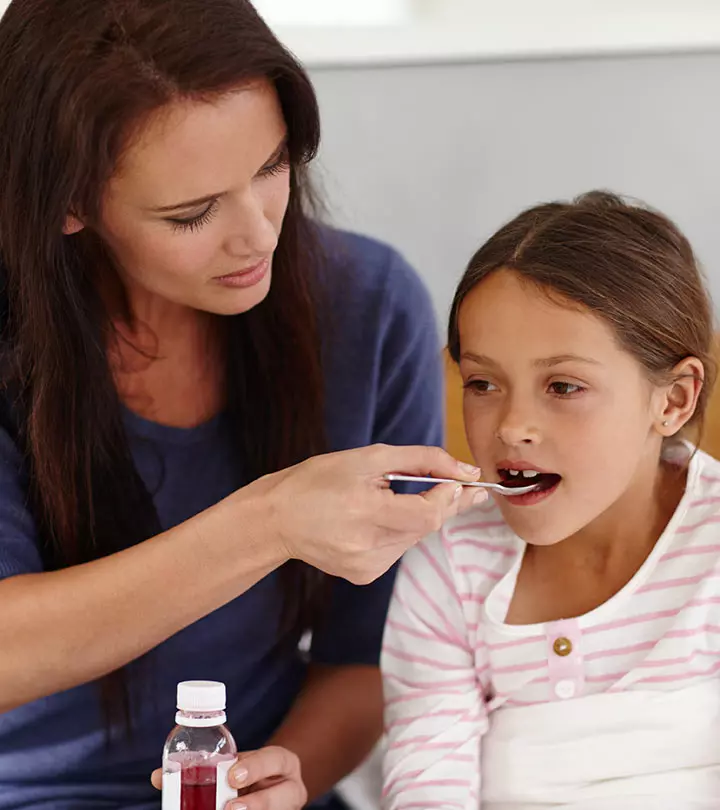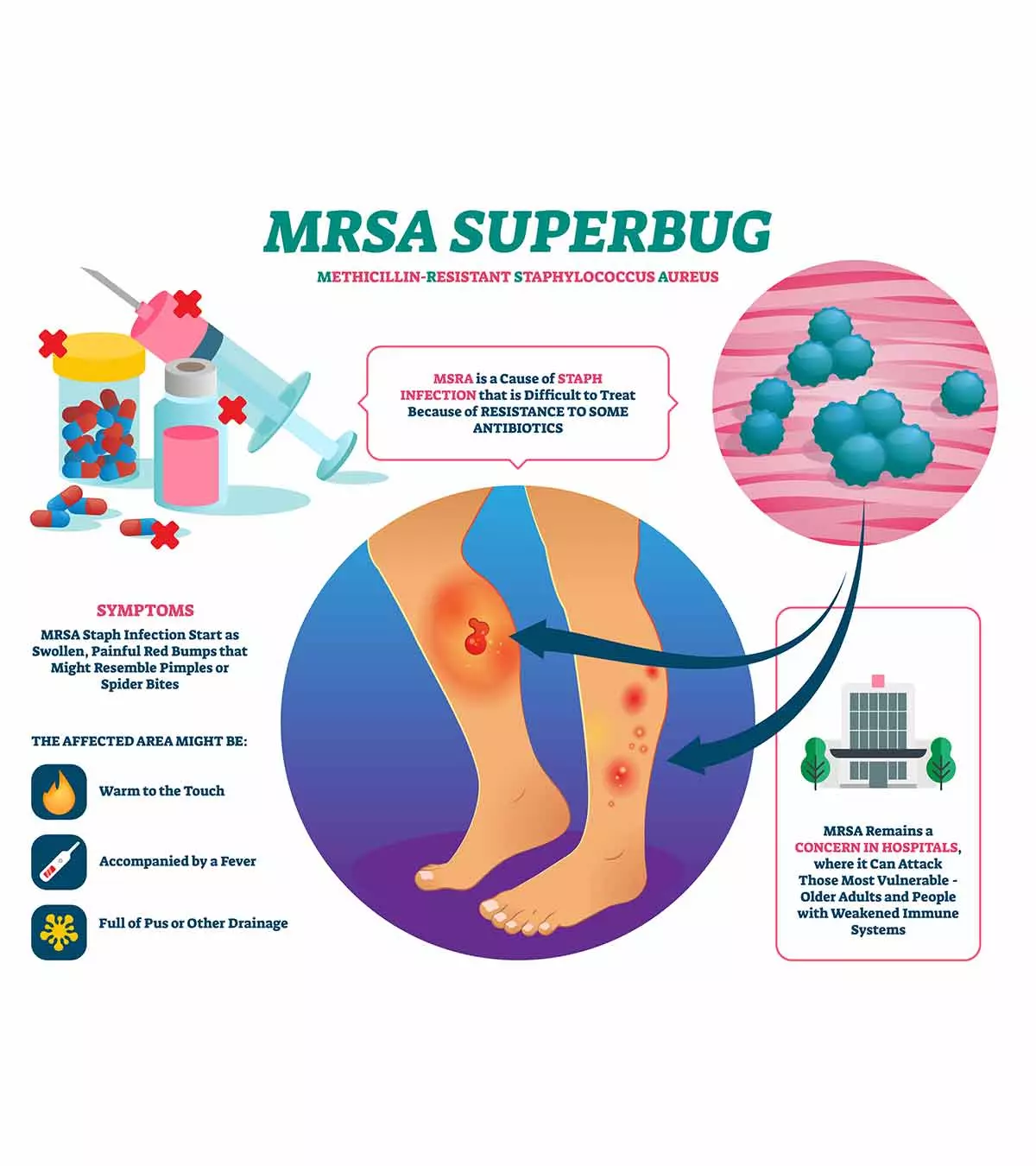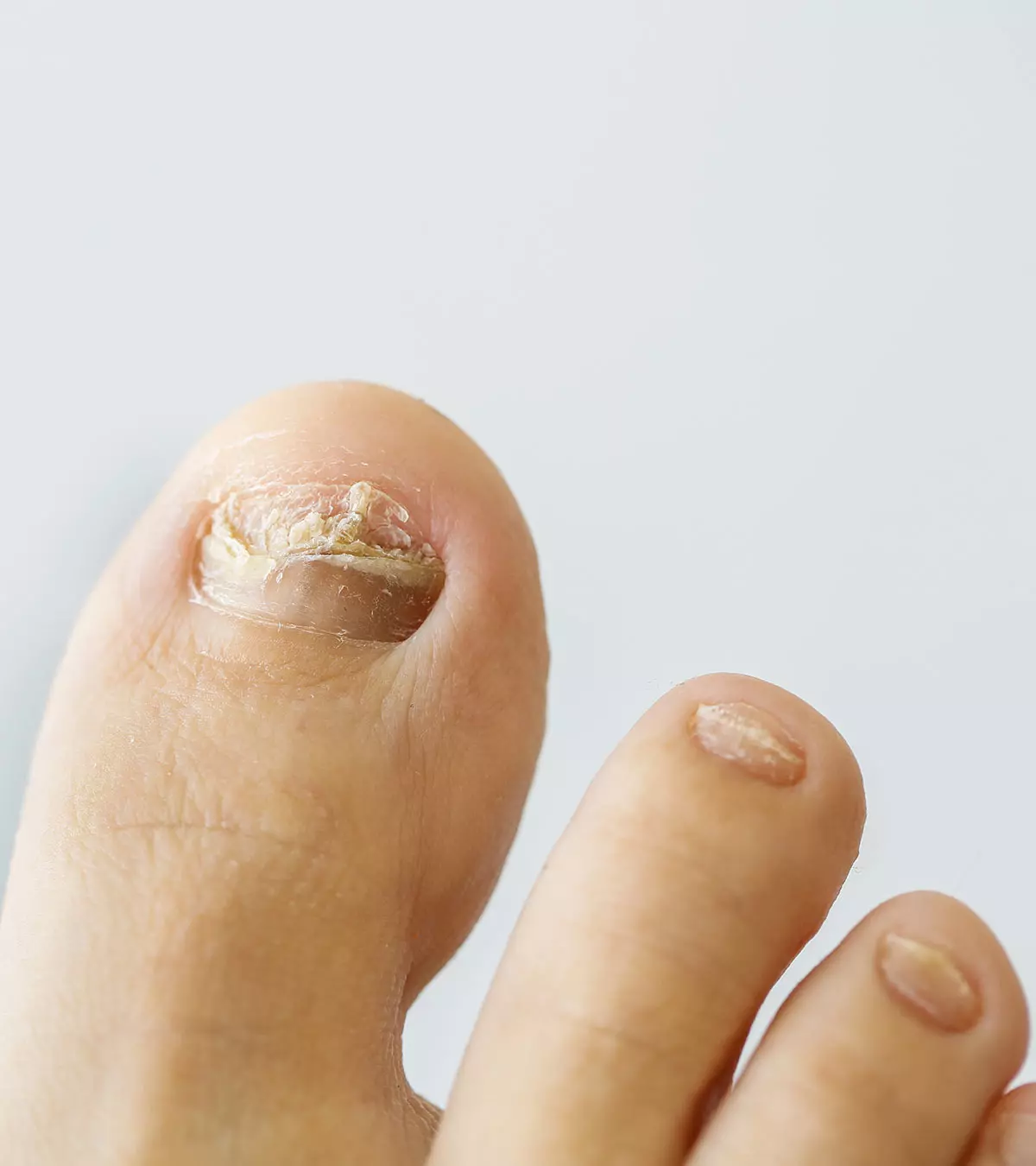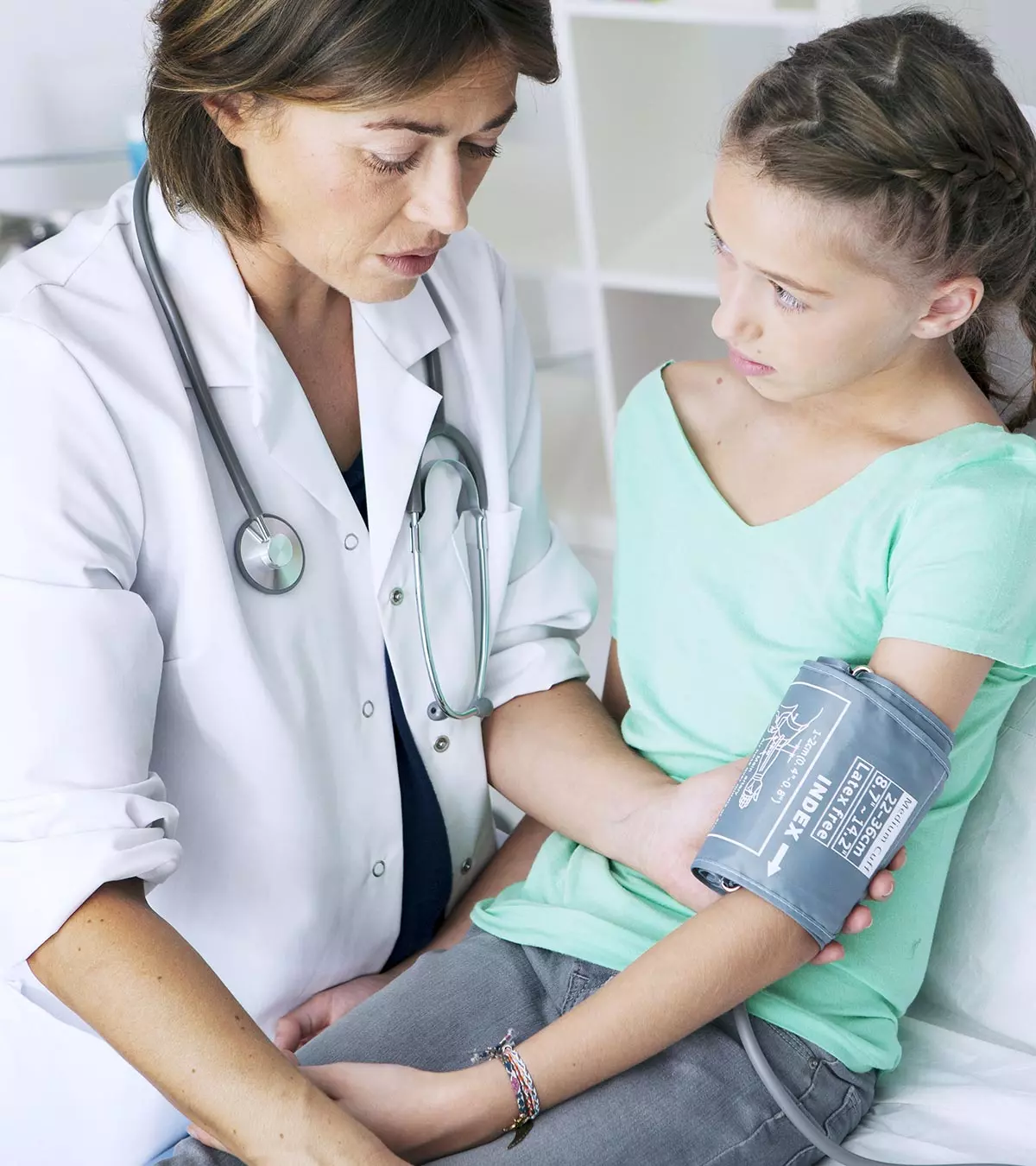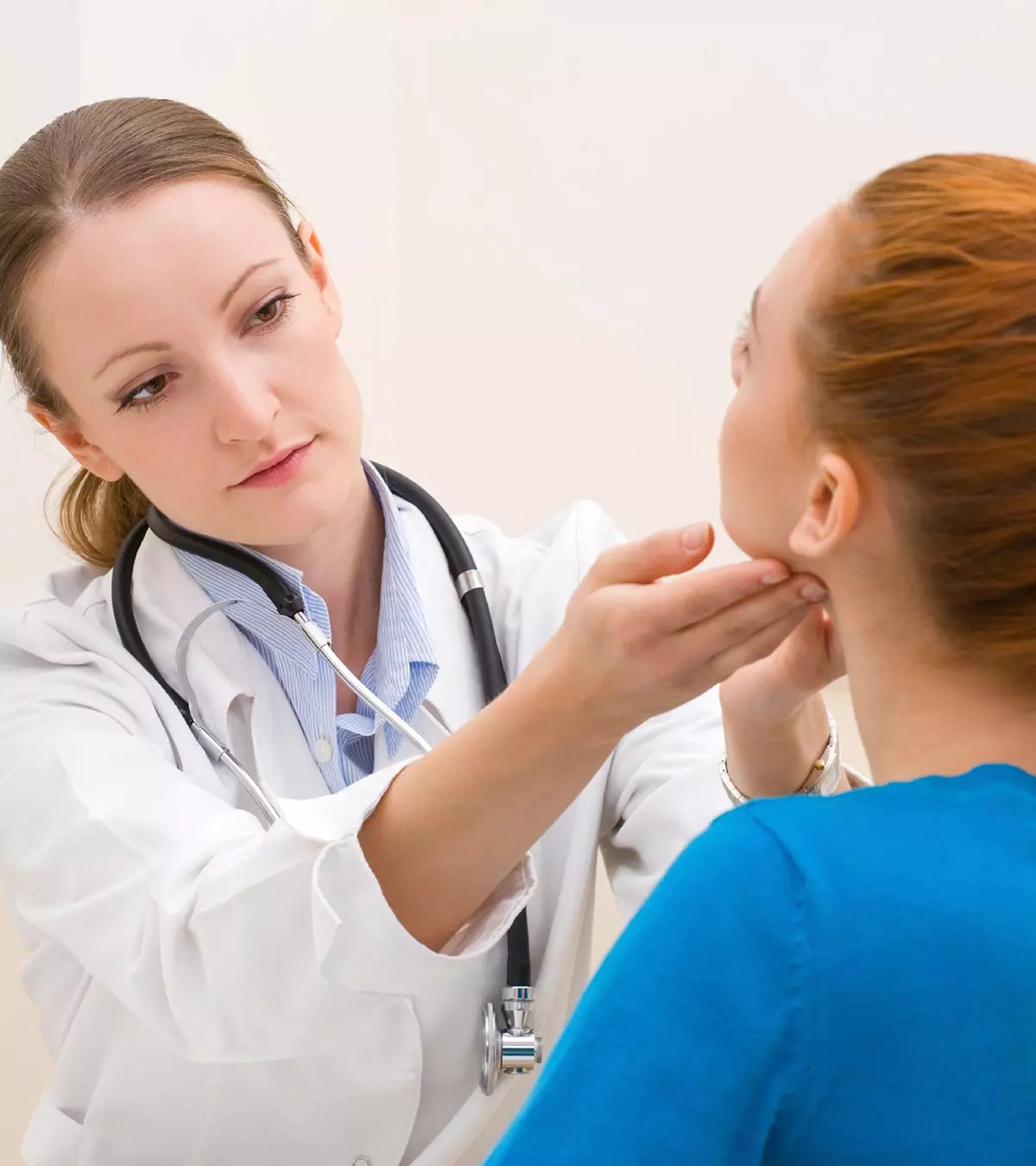
Image: iStock
Thyroid problems in teens can adversely affect their physical and mental development. The thyroid is a butterfly-shaped gland in the neck that secretes thyroid hormones to regulate metabolism and growth. It is also linked to cardiac and other vital organ functions. Thyroid malfunctions can cause hypothyroidism (underactive thyroid) or hyperthyroidism (overactive thyroid). Both these conditions can affect normal bodily functions. Although hypothyroidism is less common in teens than adults, some may develop it due to an autoimmune condition called Hashimoto’s thyroiditis. Therefore, it is essential to diagnose thyroid disorders early and treat them accordingly. Read on to know the cause, symptoms, complications, treatment, and prevention of thyroid problems in teens.
Key Pointers
- Hypothyroidism is common in children and teens due to inadequate hormone production, while hyperthyroidism is rare because of excessive production.
- Thyroid problems in teens can be congenital or caused by autoimmune diseases, dietary issues, or gland malfunctions.
- Symptoms of hypothyroidism include stunted growth, delayed puberty, brittle hair, fatigue, constipation, slow speech, and slow pulse rate.
- Symptoms of hyperthyroidism include goiter (swelling of the thyroid gland), rapid heart rate, excessive sweating, fatigue, weight loss, and restlessness.
- After testing for thyroid problems, the doctor may recommend hormone replacement therapy, dietary changes, or lifestyle modifications for the child to follow.
Types Of Thyroid Disorders In Teenagers
- Hypothyroidism (an underactive thyroid gland that fails to produce the hormones adequately) is the most commonly occurring thyroid disorder in children and teens. This endocrine system disorder could be by birth or acquired; it can also be primary, which is due to malfunctioning in the gland itself or secondary where the thyroid issues could be due to pituitary or hypothalamic disease (1).
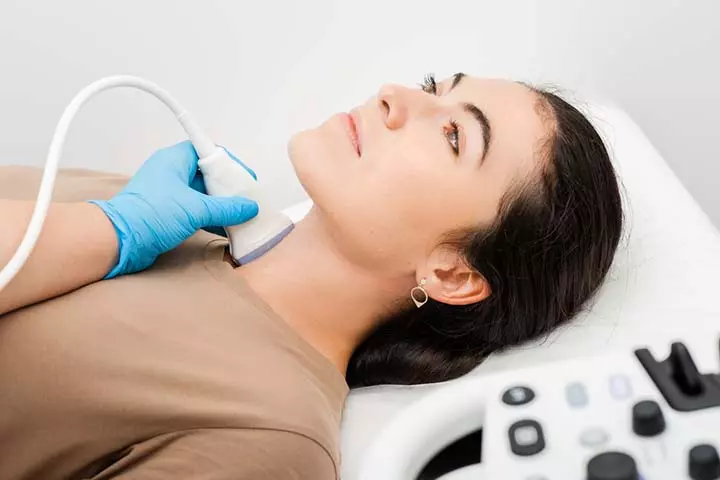
- Hyperthyroidism, which is characterized by an overactive thyroid gland that produces more amounts of hormones, is not that common unless in the case of Graves’ disease (1).
Based on the cause, this disorder could be transient or permanent. So, what could cause thyroid disorders in teenagers?
Possible Causes Of Thyroid Problems In Teenagers
Thyroid problems in teens could be due to various reasons, some of which are discussed next.
1. Congenital
Children who are born prematurely, with a low birth weight, or with Down syndrome, could be at a higher risk of having congenitaliA condition or trait present at birth and present from the beginning of one's life and is often inherited genetically thyroid disorders (2). Sometimes, maternal autoimmune diseases might also cause hypothyroidism in the baby (3). These could be the reasons for children to develop thyroid problems at birth, which might continue into puberty.
2. Autoimmune diseases
- Hashimoto’s thyroiditis and Atrophic thyroiditis are autoimmune diseasesiDiseases in which the body’s immune system mistakes healthy cells as foreign and attacks them where the body’s antibodies attack the thyroid gland and destroy it. This causes malfunctioning of the thyroid gland, resulting in hypothyroidism during puberty. (4) (5) (6).
- Graves’ disease is also an autoimmune disease that could cause hyperthyroidism in teenagers. It results from antibodies that bind to the thyroid-stimulating hormone receptors, resulting in excess production of thyroid hormones to cause hyperthyroidism (7). According to the National Institutes of Health (NIH), approximately four out of five cases of hyperthyroidism in the US are caused by Grave’s disease (24).
Children who have a family history of autoimmune diseases might be at a higher risk of developing it. Also, it is found to be more predominant in girls than in boys.
- Dietary: When your child’s iodine requirements are not met, then the thyroid gland may not function properly, causing hypothyroidism (8).

- Secondary hypothyroidism: This is caused due to malfunctioning of the pituitary glandiA tiny, pea-sized gland that is critical for controlling all other glands in the body , which is responsible for the regulation of the thyroid gland’s function (9).
 Quick fact
Quick factSigns And Symptoms Of Thyroid Problems In Teenagers
Most symptoms of thyroid problems in teenagers occur gradually and are often hard to diagnose. The absence of goiter (thyroid enlargemnt) in case of hypothyroidism makes it even more difficult to detect it. Look out for the following symptoms (if they are not already diagnosed with congenital thyroiditis) that the child may experience during puberty, to determine if they have a thyroid issue:
Hypothyroidism
- Slow growth, especially stunted height
- Delayed puberty
- Brittle and dry hair
- Fatigue
- Sensitivity towards cold
- Hoarse voice
- Dry skin
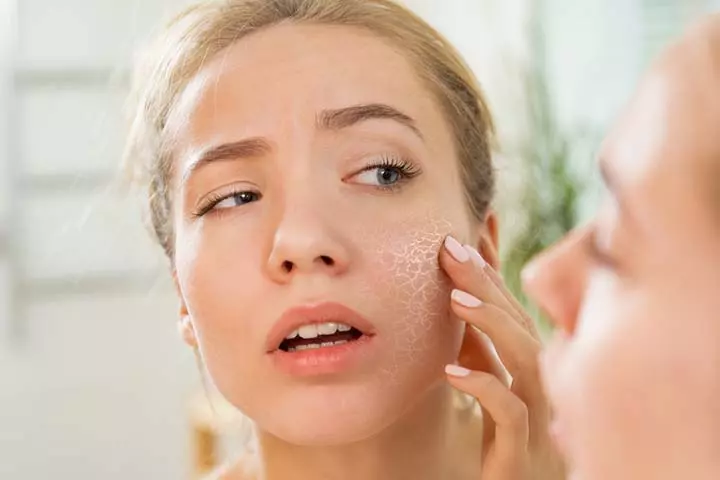
- Forgetfulness
- Weight gain
- Slow speech
- Constipation
- Irregular and or heavy menstrual periods
- DepressioniA mental disorder that can cause a long-lasting feeling of sadness and loss of interest in activities
- Droopy eyelids
- Slow pulse rate
- Hair loss, fallen hair found on the hairbrush, pillow, and bathroom (10)
Hyperthyroidism
- Enlargement of the thyroid gland (goiter)
- Rapid heart rate (heart palpitations)
- Excessive sweating

- Fatigue
- Weight loss
- Tingling sensation in the fingers
- Restlessness
- Bulging eyes
- Menstrual irregularities such as missed period in teens
- Increased urination and bowel movements
- Increased sensitivity to heat or heat intolerance
- Poor performance at school (11)
When To See A Doctor
Symptoms of thyroid issues in children are often subtle and might go unnoticed, which is why it is necessary to monitor your child’s physical development and overall wellbeing as they enter teenage years and attain puberty.
Stunted growth, especially the height, and delay in attaining puberty or the appearance of its signs, are the two most important signs of thyroid problems in teenagers. Additionally, if you find other symptoms listed above, it is best to see an endocrinologist.
Diagnosis Of Thyroid Problems
Your child’s doctor would do a physical examination of the neck and enquire about your child’s medical history. Blood tests may also be done to estimate the levels of thyroid hormones (12):
1. Thyroid-stimulating hormone (TSH)
- TSH is produced by the pituitary gland and regulates the thyroid gland’s activity.
- High TSH levels suggest hypothyroidism (an underactive thyroid), as the body tries to stimulate the thyroid to produce more hormones.
- Low TSH levels can indicate hyperthyroidism (an overactive thyroid), where the thyroid produces too many hormones, causing the pituitary to reduce TSH production.
2. Triiodothyronine (T3) and Thyroxine (T4)
- These hormones control metabolism, growth, and development.
- Low T3 and T4 levels confirm hypothyroidism, while high levels suggest hyperthyroidism.
Sometimes, a US scan or an X-ray of the neck could be done to understand the cause, and thyroid antibody tests may be ordered to identify autoimmune disorders such as Hashimoto’s or Grave’s disease.
Early diagnosis is essential to start treatment and avoid any complications.
 Point to consider
Point to considerComplications Of Thyroid Disorders In Children
If left untreated, thyroid malfunctioning can lead to:
- Problems in growth and development during puberty
- Fertility issues later in life
- A high risk of developing heart diseases
- Neuromuscular, sensory, and cognitive defects in later life
Studies stated that Hashimoto’s thyroiditis in children might be associated with the development of thyroid cancers (13). Earlier studies have also established a connection between acquired thyroid hormone deficiency and a spectrum of neurological disorders such as cerebellar ataxia (25). However, further research is required to clarify the association between the specific disorders.
Treatment For Thyroid Disorders In Children
Early identification and treatment of thyroid disorders might help regulate the growth and development of the child (14).
The primary goal of the treatment is to correct the levels of thyroid hormones and restore growth and development in the child. However, the course of treatment for thyroid disorders depends on the underlying cause.
- If your child’s thyroid issues are due to reduced function, then your doctor might prescribe hormone replacement therapy, where daily pills of synthetic thyroid hormones are given. The child may have to take this medication every day for the rest of life (15).
- If your child’s thyroid problems are due to iodine deficiency, then a daily intake of iodized salt might help in restoring the levels of thyroid hormones (16).

- Rarely, but in extreme cases, radioactive iodine or surgery may be considered to remove the gland in case of hyperfunction.
- In some cases, it may be indicated to remove part or whole of the thyroid gland by surgery.
Ensure regular monitoring and follow-up visits with healthcare providers. They may help track the child’s response to therapy, ensure the hormone levels are within the target range, and allow for timely adjustments to medication doses as needed.
Lifestyle Changes To Manage Thyroid Problems in Teens
To manage thyroid problems in teens, making some lifestyle changes can help (23) (26).
- First, follow a diet low in sugar and processed foods, since they can cause inflammation and worsen symptoms of an underactive thyroid.
- Be mindful of cruciferous vegetable intake, as foods like cabbage and broccoli might disrupt thyroid hormone production.
- Consume foods rich in zinc, magnesium, selenium, and vitamin B12, as these may support thyroid functioning.
- Do things that can help reduce stress, as stress can lead to resistance to thyroid hormones.
- Engage in regular physical activities and maintain a healthy body weight, as excess weight can increase the body’s demand for thyroid hormones.
- Avoid consuming self-proclaimed thyroid booster supplements containing kelp or sea moss, as these may interfere with thyroid functioning in people with a diagnosed thyroid condition.
- Limit or avoid the consumption of soya and foods containing soy derivatives, as these may interfere with the absorption of levothyroxine supplements.
- Include vitamin D supplements of 10mcg each day for everyone over five years of age to aid in a balanced thyroid functioning.
- Be mindful about how nutritional supplements such as calcium, iron, and biotin may interfere with thyroid hormones. For instance, consume only the recommended dose of biotin supplements, as excess can make hormonal levels overactive.
- There should be an interval of four hours between the consumption of calcium or iron supplements and levothyroxine, as both these supplements interfere with the hormone’s absorption (17).
Frequently Asked Questions
1. How do I check my thyroid at home?
You can check your thyroid at home by following these steps (18):
- Locate your thyroid between the collarbones and Adam’s apple
- Keep looking at the targeted space of your neck through a mirror while tilting your head back
- Take a sip of water in this position and observe the thyroid for any lumps or bumps while gulping the water
2. What are the best foods to eat for thyroid?
The foods needed during thyroid problems depend on the type of the problem.
For hypothyroidism (19):
- Iodine-rich foods such as fish, greek yogurt, and seaweed
- AntioxidantiMan-made or natural substances that may prevent or slow down cell damage caused due to harmful molecules called free radicals -rich fruits and vegetables
- Selenium-rich foods such as nuts and eggs
For hyperthyroidism (20):
- Vitamin B and iron-rich foods
- Antioxidant-rich foods such as blueberries, cherries, bell peppers
3. Does hyperthyroidism cause early puberty?
Although it is unknown how hyperthyroidism affects pubertal growth, a brief term of hyperthyroidism does not appear to produce any significant side effects (21).
4. Can thyroid issues cause behavior problems?
The thyroid hormone plays a significant role in regulation of cognition, behavior, and mood swings. Therefore, an alteration in these hormones may lead to behavioral changes. Moreover, behavioral changes can occur with or without the other classic symptoms of hypothyroidism (22).
5. Can puberty affect thyroid levels?
Some researchers have shown decreasing or constant TSH levels and a progressive reduction in the circulating thyroid hormones with ongoing puberty (23).
Thyroid problems in teens could be congenital or develop due to autoimmune diseases. Inadequate iodine intake is another prominent cause of an increase in a teen’s risk of developing thyroid, especially if they have a family history of autoimmune diseases. Thyroid can silently affect your teen’s physical and mental development. Excess weight gain in teens and poor performance at school are frequent indicators. Thus, its timely diagnosis and treatment are essential. If untreated, thyroid problems could cause adverse complications. Fortunately, timely medical intervention and healthy lifestyle changes can help teens live healthy, happy, and productive lives.
Infographic: Signs Of Hyper And Hypothyroidism In Teenage Boys And Girls
Does your child have a thyroid problem? Often health issues may go unnoticed and become a more serious problem later when the symptoms are ignored or unknown. So learn the typical signs of hyper and hypothyroidism in teenagers to take timely medical help and relieve them of the discomfort. Illustration: Momjunction Design Team
Illustration: Thyroid Problems In Teens: Types Signs Causes & Treatment

Image: Stable Diffusion/MomJunction Design Team
Learn about thyroid problems in children. Understand how to identify and treat them from this video.
References
1. Nelly Capetillo-Ventura, and Inmaculada Baeza; Psychiatric Symptoms due to Thyroid Disease in a Female Adolescent; Case Reports in Endocrinology- Hindawi
2. Maria Segni; Disorders of the Thyroid Gland in Infancy, Childhood and Adolescence; NCBI
3. Maria Cristina Vigone,Donatella Capalbo,Giovanna Weber, and Maria Carolina Salerno; Mild Hypothyroidism in Childhood: Who, When, and How Should Be Treated?; Journal of the Endocrine Society
4. Hypothyroidism; Clinical Thyroidology For The Public; American Thyroid Association
5. Olga Hardy, et al.; Hypothyroidism in Down Syndrome: Screening Guidelines and Testing Methodology; NCBI
6. Luis J.Jara, Olga Vera-Lastra, and, Gabriela Medina; Atrophic Thyroiditis; Springerlink
7. Dr Christian M. Girgis, Bernard L. Champion, and Jack R. Wall; Current Concepts in Graves’ Disease; NCBI
8. Umesh Kapil; Health Consequences of Iodine Deficiency; Sultan Qaboos University Medical Journal
9. Hypothyroidism Secondary; UCLA Health
10. I Kostoglou-Athanassiou, and K Ntalles; Hypothyroidism – new aspects of an old disease; Hippokratia
11. Kanshi Minamitani, et al.; Guidelines for the treatment of childhood-onset Graves’ disease in Japan, 2016; Clinical Pediatric Endocrinology
12. Thyroid Function Tests; American Thyroid Association
13. Laura Penta, et al.; Hashimoto’s Disease and Thyroid Cancer in Children: Are They Associated?; Frontiers In Endocrinology
14. Hanley P, Lord K, Bauer AJ; Thyroid Disorders in Children and Adolescents: A Review; NCBI
15. James Hennessey, Leonard Wartofsky; Hashimoto’s Disease; The Journal Of Clinical Endocrinology and Metabolism
16. Creswell J Eastman, M.D. and Michael B Zimmermann; The Iodine Deficiency Disorders; NCBI
17. 5 Easy Steps to Keep Your Thyroid Healthy; Hartford HealthCare
18. Thyroid Disease; Cleveland Clinic
19. Foods to avoid and adopt if suffering from hypothyroidism; K.J. Somaiya Hospital & Research Center
20. Hyperthyroidism; Mount Sinai
21. Thyroid function and puberty; National Library of Medicine
22. Hypothyroidism Presenting as Psychosis: Myxedema Madness Revisited; National Library of Medicine
23. Yvan Fleury, et al.; Sex-Dependent Variations and Timing of Thyroid Growth during Puberty; The Journal of Clinical Endocrinology & Metabolism
24. Graves’ Disease; NIDDK, U.S. Department of Health and Human Services
25. Debika Nandi-Munshi and Craig E Taplin; Thyroid-related neurological disorders and complications in children; Pediatric Neurology
26. Diets and supplements for thyroid disorders; British Thyroid Foundation
Community Experiences
Join the conversation and become a part of our nurturing community! Share your stories, experiences, and insights to connect with fellow parents.
Read full bio of Dr. Sameh Mahmoud Shehata
Read full bio of Dr Bisny T. Joseph
Read full bio of Swati Patwal
Read full bio of Anindita Ghatak








